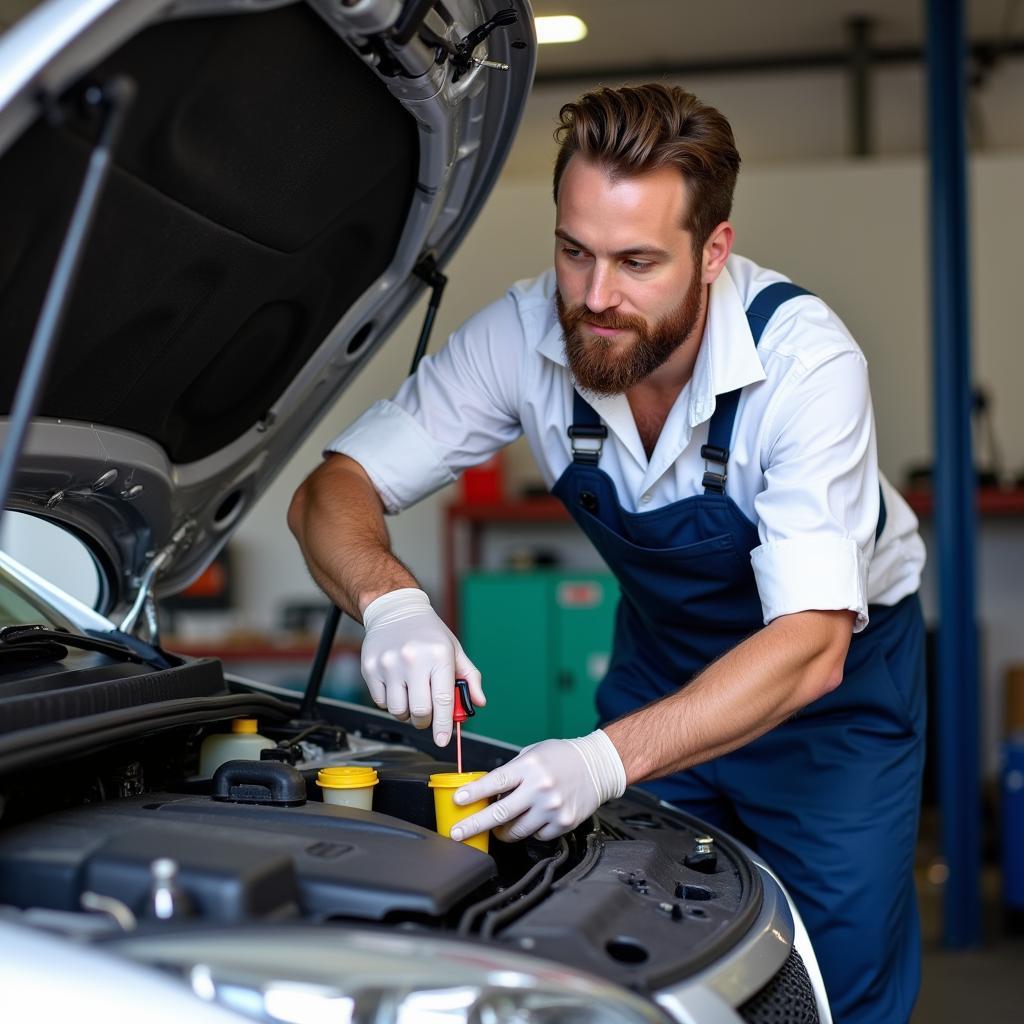If your Car Has Problems Starting In Hot Weather, you’re not alone. This frustrating issue is a common summer woe for many drivers. Understanding the potential causes and solutions can save you time, money, and a lot of aggravation. This guide dives deep into the reasons why your car might struggle to start when the mercury rises and offers practical solutions to get you back on the road.
Why Does My Car Have Trouble Starting in Hot Weather?
Several factors can contribute to hot weather starting problems. High temperatures can affect various car components, making it difficult to pinpoint the exact culprit. Let’s explore some of the most common causes:
Vapor Lock
Fuel vapor lock is a frequent offender in hot weather. High temperatures can cause the fuel in your fuel lines to vaporize, creating air bubbles that disrupt the flow of fuel to the engine. This makes it hard for the engine to get the fuel it needs to start.
Battery Issues
Extreme heat can accelerate battery degradation. A weakened battery may struggle to provide the necessary power to crank the engine, especially in hot weather when other components, like the cooling fan, also demand power.
Starter Motor Problems
The starter motor is a key component in the starting process. High temperatures can put additional strain on the starter motor, leading to malfunctions or reduced effectiveness.
Ignition System Problems
Components within the ignition system, like the ignition coil and spark plugs, can be susceptible to heat damage. This can disrupt the spark delivery to the engine cylinders, hindering combustion and preventing the car from starting.
Troubleshooting Hot Weather Starting Issues: Step-by-Step
If your car has problems starting in hot weather, follow these steps to diagnose the issue:
-
Check the Battery: Inspect the battery terminals for corrosion. Clean them with a wire brush and baking soda solution if necessary. Test the battery voltage using a multimeter. A weak reading could indicate a failing battery.
-
Listen for the Starter Motor: When you turn the key, do you hear a clicking sound or nothing at all? A clicking sound might indicate a failing starter motor or solenoid. No sound could point to a dead battery or a faulty ignition switch.
-
Inspect the Fuel System: Check the fuel lines and fuel filter for leaks or blockages. If you suspect vapor lock, try starting the car in the shade or later in the evening when temperatures are cooler.
-
Check the Ignition System: Inspect the spark plugs and ignition coils for signs of wear or damage. Replace them if necessary.
Preventing Hot Weather Starting Problems
Taking preventative measures can help avoid starting issues during the summer months:
-
Regular Battery Maintenance: Have your battery tested regularly, especially before the onset of summer. Consider replacing your battery every 3-5 years.
-
Park in the Shade: Whenever possible, park your car in the shade to minimize heat buildup.
-
Use a Sunshade: Using a sunshade can help keep the interior of your car cooler, reducing the strain on the battery and other components.
-
Keep Your Car Well-Maintained: Regular maintenance, including tune-ups and fluid changes, can help prevent many common car problems, including hot weather starting issues.
“Regular maintenance is key to preventing hot weather starting issues,” says renowned automotive engineer, David Miller. “Just like staying hydrated prevents heatstroke in humans, regular fluid changes and tune-ups can keep your car running smoothly in the summer heat.”
 Regular Car Maintenance to Prevent Hot Weather Starting Issues
Regular Car Maintenance to Prevent Hot Weather Starting Issues
Conclusion
Experiencing starting problems in hot weather can be frustrating, but understanding the potential causes and solutions can empower you to address the issue effectively. By following the troubleshooting steps and preventative measures outlined in this guide, you can keep your car running reliably throughout the summer. If you continue to experience difficulties, don’t hesitate to connect with AutoTipPro for expert assistance. You can reach us at +1 (641) 206-8880 or visit our office at 500 N St Mary’s St, San Antonio, TX 78205, United States.
FAQ
-
Why is my car harder to start when it’s hot? Heat can impact several car components, including the battery, starter, fuel system, and ignition system, making it harder for the engine to start.
-
What is vapor lock? Vapor lock occurs when fuel in the fuel lines vaporizes due to high temperatures, creating air bubbles that disrupt fuel flow to the engine.
-
How can I prevent hot weather starting problems? Regular battery maintenance, parking in the shade, using a sunshade, and keeping your car well-maintained can help prevent hot weather starting issues.
-
How often should I replace my car battery? It’s generally recommended to replace your car battery every 3-5 years.
-
What should I do if my car won’t start in hot weather? Follow the troubleshooting steps outlined in this guide, including checking the battery, starter, fuel system, and ignition system. If the problem persists, contact a qualified mechanic.
-
Can extreme heat damage my car’s engine? Yes, prolonged exposure to extreme heat can damage various engine components, including the battery, starter, and ignition system.
-
Is it safe to drive my car if it’s overheating? No, it’s not safe to drive a car that’s overheating. Pull over to a safe location and let the engine cool down before continuing.





Leave a Reply